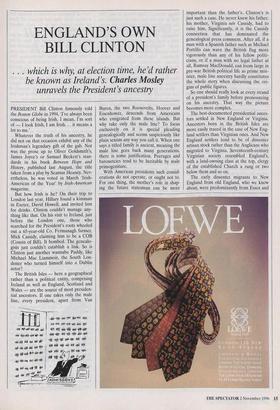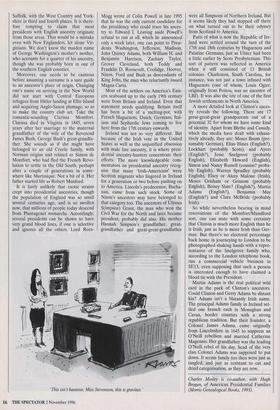ENGLAND'S OWN BILL CLINTON
. . . which is why, at election time, he'd rather
be known as Ireland's. Charles Mosley
unravels the President's ancestry
PRESIDENT Bill Clinton famously told the Boston Globe in 1994, 'I've always been conscious of being Irish. I mean, I'm sort of — I look Irish, I am Irish. . . it means a lot to me.'
Whatever the truth of his ancestry, he did not on that occasion exhibit any of the Irishman's legendary gift of the gab. Nor was the prose up to Oliver Goldsmith's, James Joyce's or Samuel Beckett's stan- dards in his book Between Hope and History, published last August, the title taken from a play by Seamus Heaney. Nev- ertheless, he was voted in March 'Irish- American of the Year' by Irish-American magazine.
But how Irish is he? On their trip to London last year, Hillary found a kinsman in Exeter, David Howell, and invited him for drinks. Clinton couldn't manage any- thing like that. On his visit to Ireland, just before the London one, those who searched for the President's roots wheeled out a 65-year-old Co. Fermanagh farmer, Mick Cassidy, claiming him to be a COB (Cousin of Bill). It bombed. The genealo- gists just couldn't establish a link. So is Clinton just another wannabe Paddy, like Michael Mac Liammoir, the South Lon- doner who turned himself into a Dublin actor?
The British Isles — here a geographical rather than a political entity, comprising Ireland as well as England, Scotland and Wales — are the source of most presiden- tial ancestors. If one takes only the male line, every president, apart from Van Buren, the two Roosevelts, Hoover and Eisenhower, descends from Americans who emigrated from these islands. But why take only the male line? To focus exclusively on it is special pleading genealogically and seems suspiciously like plain sexism any way you call it. When one says a titled family is ancient, meaning the male line goes back many generations, there is some justification. Peerages and baronetcies tend to be heritable by male primogeniture.
With American presidents such consid- erations do not operate, or ought not to. For one thing, the mother's role in shap- ing the future statesman can be more
important than the father's. Clinton's is just such a case. He never knew his father; his mother, Virginia née Cassidy, had to raise him. Significantly, it is the Cassidy connection that has dominated the genealogical press comment. After all, if a man with a Spanish father such as Michael Portillo can wave the British flag more vigorously than any of his fellow politi- cians, or if a man with no legal father at all, Ramsay MacDonald, can loom large in pre-war British political life as prime min- ister, male line ancestry hardly constitutes the whole story when discussing the ori- gins of public figures.
So one should really look at every strand of a president's family before pronouncing on his ancestry. That way the picture becomes more complex.
The best-documented presidential ances- tors settled in New England or Virginia. Ancestors born in the British Isles are more easily traced in the case of New Eng- land settlers than Virginian ones. And New England settlers tend to be of dissenter artisan stock rather than the Anglicans who migrated to Virginia. Seventeenth-century Virginian society resembled England's, with a land-owning class at the top, clergy of the established Church a rung or two below them and so on.
The early dissenter migrants to New England from old England, who we know about, were predominantly from Essex and Suffolk, with the West Country and York- shire in third and fourth places. It is there- fore tempting to claim that most presidents with English ancestry originate from those areas. That would be a mistake even with New Englanders, let alone Vir- ginians. We don't know the maiden name of George Washington's mother's mother, who accounts for a quarter of his ancestry, though she was probably born in one of the southern English counties.
Moreover, one needs to be cautious before assuming a surname is a sure guide to an ancestor's place of origin. Changing one's name on arriving in the New World did not start with Central European refugees from Hitler landing at Ellis Island and acquiring Anglo-Saxon plumage, so as to make the country club set. Take the romantic-sounding Clarissa Montfort. Clarissa died in Virginia in 1845, seven years after her marriage to the maternal grandfather of the wife of the Reverend James Bush, George Bush's great-grandfa- ther. She sounds as if she might have belonged to an old Creole family, with Norman origins and related to Simon de Montfort, who had fled the French Revo- lution to settle in the Old South, perhaps after a couple of generations in some- where like Martinique. Not a bit of it. Her father started life as Robert Munford.
It is fairly unlikely that exotic strains crept into presidential ancestries, though the population of England was so small several centuries ago, and is so swollen now, that millions of people today descend from Plantagenet monarchs. Accordingly, several presidents can be shown to have very grand blood lines, if one is selective and ignores all the others. Lord Rees- Mogg wrote of Cohn Powell in late 1995 that he was the only current candidate for the presidency who could trace his ances- try to Edward I. Leaving aside Powell's refusal to run at all, which he announced only a week later, one can point to Presi- dents Washington, Jefferson, Madison, John Quincy Adams, both William H. and Benjamin Harrison, Zachary Taylor, Grover Cleveland, both Teddy and Franklin D. Roosevelt, Coolidge, Hoover, Nixon, Ford and Bush as descendants of King John, the man who reluctantly issued Magna Carta.
Most of the settlers on America's East- ern seaboard up to the early 19th century were from Britain and Ireland. Even that statement needs qualifying. Britain itself has been a bit of a melting-pot, with French Huguenots, Dutch, Germans, Ital- ians and Sephardic Jews coming to live here from the 17th century onwards.
Ireland was not so very different. But because of the Irish vote in the United States as well as the unjustified obsession with male line ancestry, it is where presi- dential ancestry-hunters concentrate their efforts. The more knowledgeable com- mentators on presidential ancestry recog- nise that many 'Irish-Americans' were Scottish migrants who lingered in Ireland for a generation or two before pushing on to America. Lincoln's predecessor, Bucha- nan, came from such stock. Some of Nixon's ancestors may have belonged to that category too. The ancestors of Ulysses S(impson) Grant, the man who won the Civil War for the North and later became president, probably did also. His mother Hannah Simpson's grandfather, great- grandfather and great-great-grandfather `This isn't hauteur, Miss Stevenson, this is gravitas.' were all Simpsons of Northern Ireland. But it seems likely they had stopped off there on what turned out to be their odyssey from Scotland to America.
Parts of what is now the Republic of Ire- land were settled around the turn of the 17th and 18th centuries by Huguenots and Palatine Germans, just as Ulster had been a little earlier by Scots Presbyterians. This sort of pattern was reflected in America when it still consisted of 13 British colonies. Charleston, South Carolina, for instance, was not just a town infused with Huguenots (one of whom, Louis Ogier, originally from Poitou, was an ancestor of LBJ). It was also the site of one of the first Jewish settlements in North America.
A more detailed look at Clinton's ances- try reveals the following. There are 17 great-great-great grandparents out of a potential 32 for whom we have some kind of identity. Apart from Blythe and Cassidy, which the media have dealt with exhaus- tively already, they are: Moses Baum (pre- sumably German), Elias Hines (English?), Lockhart (probably Scots), and Ayers (English?), Jesse Snelgrove (probably English), Elizabeth Howard (English), Simon and Nancy Russell (cousins? proba- bly English), Warren Spradley (probably English), Elsey or Alcey Malone (Irish), Moses Grisham or Grissom (probably English), Betsey Slate? (English?), Martin Adams (English?), Benjamin May (English?) and Clara McBride (probably Irish).
So while nevertheless bearing in mind reservations of the Montfort/Mundford sort, one can state with some certainty that Clinton is much more English than he is Irish, just as he is more Irish than Ger- man. But there's no electoral percentage back home in journeying to London to be photographed shaking hands with a repre- sentative of the Snelgrove family who, according to the London telephone book, run a commercial vehicle business in SE13, even supposing that such a person is interested enough to have claimed a blood tie with the President.
Martin Adams is the real political wild card in the pack of Clinton's ancestors. Could Clinton and Gerry Adams be distant kin? Adams isn't a blatantly Irish name. The principal Adams family in Ireland set- tled one branch each in Monaghan and Cavan, border counties with a strong republican tradition. But their founder, a Colonel James Adams, came originally from Lincolnshire in 1645 to suppress an O'Neill rebellion and married Catherine Magennis. Her grandfather was the leading O'Neill rebel of his day, head of the very clan Colonel Adams was supposed to put down. It seems family ties then were just as tangled, and just as resistant to cut and dried categorisation, as they are now.
Charles Mosley is co-author, with Hugh Brogan, of American Presidential Families (Morris Genealogical Books, 1993).



















































































 Previous page
Previous page